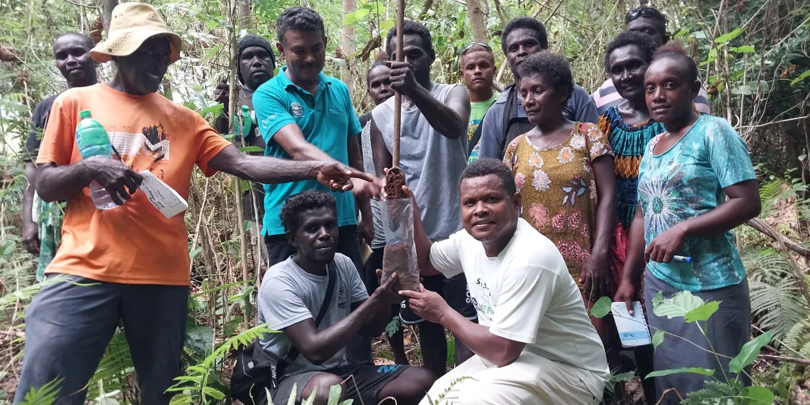In the heart of the Solomon Islands, nestled along the shores of Gizo, lies Sairagi Village. Traditional farming has sustained families for generations. Yet, in recent years, villagers have faced an alarming challenge—declining crop yields.
Despite their commitment to organic agriculture, their primary food transformation pathway, poor soil health has led to stunted crop growth and low yields. With limited harvests, many farmers have turned to selling their marine catch to afford imported staple foods from supermarkets, straining both their economy and food security.
To find solutions, a team from the Pacific Community (SPC) and the World Wide Fund for Nature (WWF) visited Sairagi to identify soil deficiencies causing low yields and introduce sustainable farming practices to restore productivity.
Equipped with soil sampling tools, the team surveyed farms across the village. They collected soil samples to analyse soil organic carbon, total nitrogen (N), phosphorus (P), potassium (K), and other trace elements—critical nutrients that determine soil fertility.
Initial observations pointed to two major concerns: Slash-and-burn agriculture, a long-standing practice, was rapidly depleting soil organic matter. With each cycle of burning, valuable nutrients were lost, leaving behind infertile soil.
Secondly, farming on marginal lands was worsening soil erosion, washing away essential topsoil, and further reducing crop productivity.
Recognising the urgent need for change, the team recommended contour farming—a method of planting along natural land contours to reduce soil erosion. They also recommended vetiver grass planting, a technique that stabilises soil and prevents runoff.
However, the key intervention lies in nutrient restoration. By analysing the collected soil samples, the team could tailor organic composts to replenish missing nutrients, addressing soil deficiencies. This approach would enhance soil fertility while preserving organic farming principles, ensuring that future crops would thrive.
Mrs Nerolin, a dedicated farmer, said, “This is the first time anyone has collected soil samples to see what’s wrong with our land.”
“We know food security is important, but now we understand that soil security is just as critical—because everything we grow comes from the soil beneath us.”
Her words resonated with the community. If the soil could be healed, food production could be revitalised, reducing their dependence on external food sources.
Villagers of Sairagi remain committed to organic agriculture. By embracing food transformation pathways that prioritise soil restoration, they are not just farming for today but laying the foundation for generations to come.
– Source: SPC









